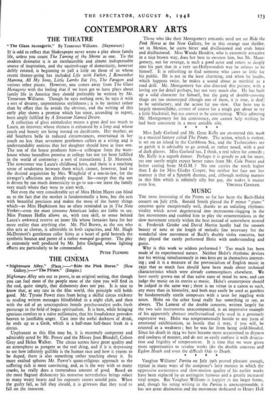CONTEMPORARY ARTS
THE THEATRE
" The Glass Menagerie." By Tennessee Williams. (Haymareet.)
IT is odd to reflect that Shakespeare never wrote a play about family life, unless you count The Taming of the Shrew as one. To the modern dramatist it is an inexhaustible and almost indispensable source of inspiration, and the squirrel-cage of domesticity, however deftly rotated, is beginning to pall a little on those of us whose recent theatre-going has included Life with Father, I Remember Mamma, All My Sons, Little Lambs Eat Ivy, The Paragon and various other pieces. However, one comes away from The Glass Menagerie with the feeling that if we have got to have plays about family life in America they should preferably be written by Mr. Tennessee Williams. Though he says nothing new, he says it with a sort of dreamy, unpretentious stylishness ; it is by instinct rather than by effort that he avoids the obvious, and the writing of this early play shows a promise which has since, according to report, been amply fulfilled by A Streetcar Named Desire.
A collection of glass animalculae means a great deal too much to Laura, an introvert whose shyness is enhanced by a limp and whose youth and beauty are being wasted on daydreams. Her mother, an old Southern belle in reduced circumstances, entertained in her youth no less than seventeen gentlemen callers at a sitting and is understandably anxious that her daughter should have at least one. The son of the house produces him—a colleague from the ware- house whose boundless promise at college has not yet been fulfilled in the world of commerce : a sort of transatlantic J. D. Marstock. The newcomer was Laura's childhood hero, and there is a touching scene of tenderness between them which cannot, however, lead to the desired acquisition by Mrs. Wingfield of a son-in-law, for the stranger's affections are already engaged. So—except that the son is driven by too much domesticity to go-10 sea—we leave the family very much where they were to start with. •
Not even the very considerable art of Miss Helen Hayes can blind us to the fact that the mother is fundamentally a bore, but she acts with beautiful precision and makes the most of the funny things which—as Miss Hopkinson has so often reminded us in The New Yorker—even the most tiresome American ladies are liable to say. Miss Frances Heflin allows us, with rare skill, to sense behind Laura's awkward reserve an inner life whose fantasies have for her more reality than anything else. Mr. Phil Brown, as the son who also acts as chorus, is admirable in both capacities, and Mr. Hugh McDermott's gentleman caller hints at a heart of gold beneath the synthetic bounce and patter of a rather manqué go-getter. The play is extremely well produced by Mr. John Gielgud, whose lighting effects are particularly to be commended.
PETER FLEMING


































 Previous page
Previous page